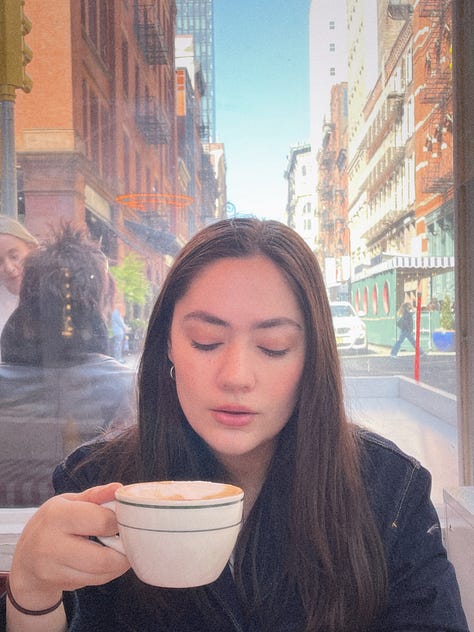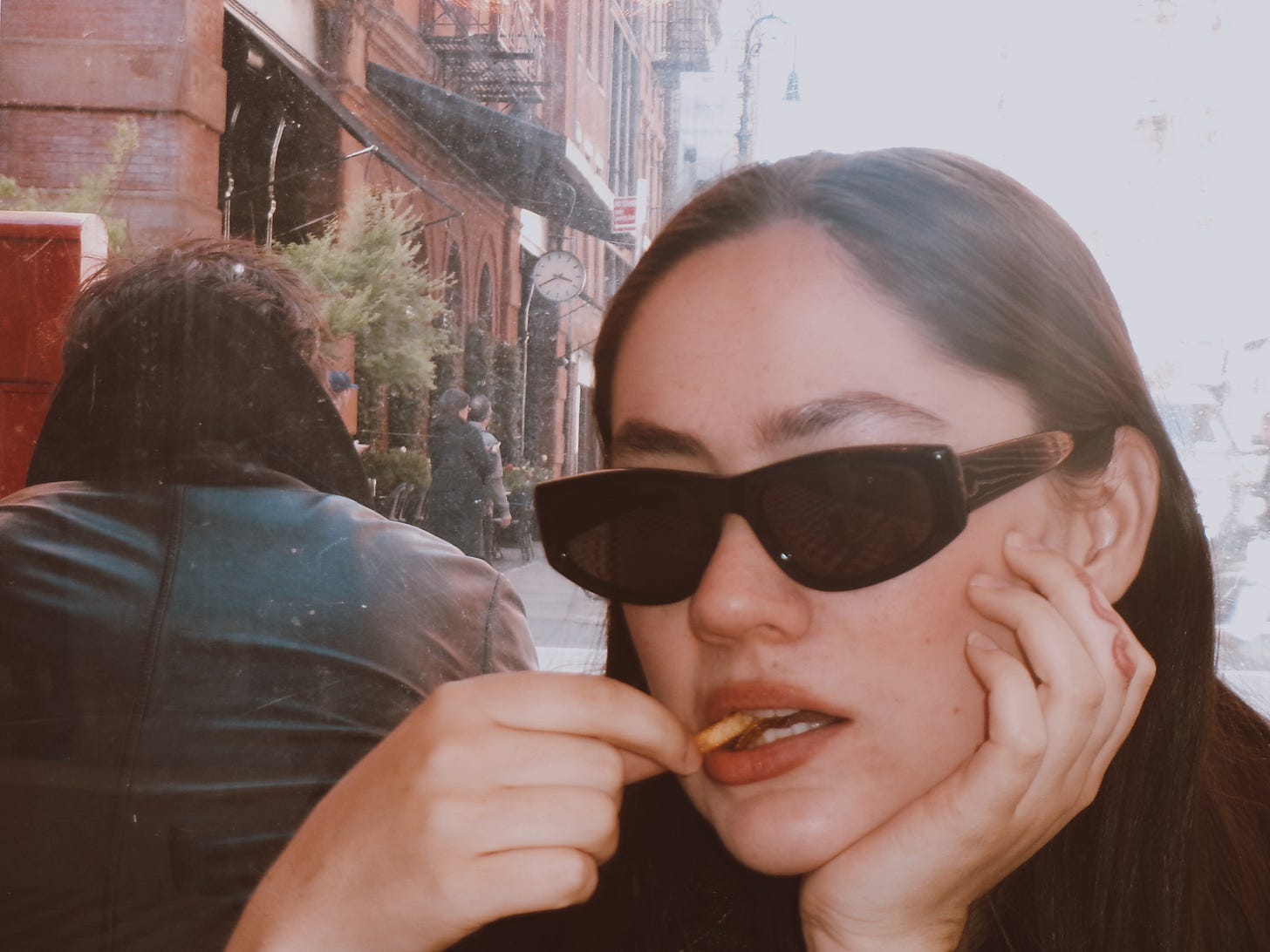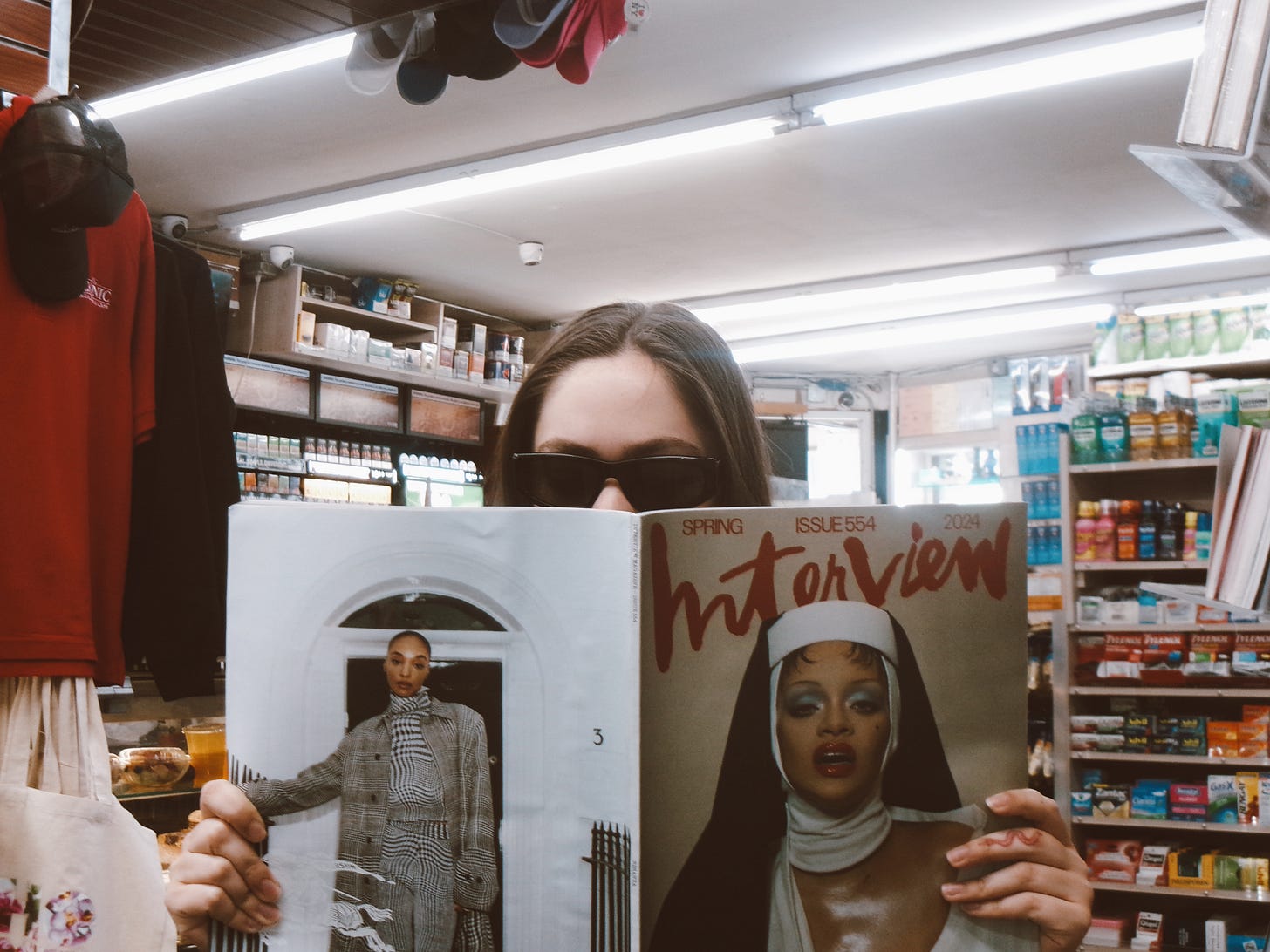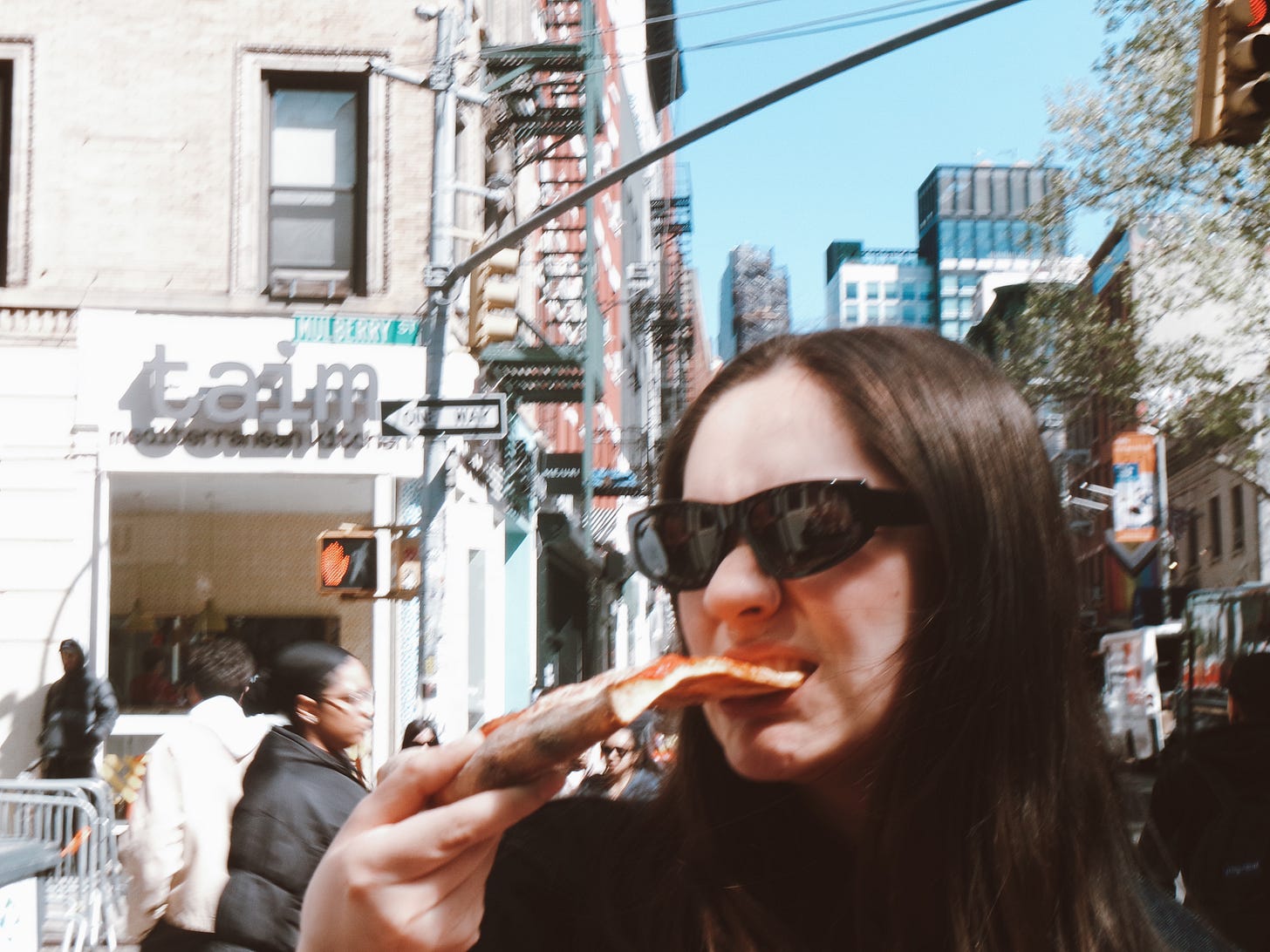Mia Trubelja knows exactly what she wants
"It’s just wanting to be part of something, wanting to be part of making art, I see this as my way in. "
From the moment we planned this interview, she had already dm’d me a pinterest board for the style of photos she wanted taken, where she wanted to meet for the interview, and the specific shops and streets that she wanted to walk through. We meet at Thai Diner in Nolita. I get there slightly early and try to get seated in the cabana, “They have pretty lanterns there,” she texts me. She wasn’t wrong.
We promptly get seated (we meet at 1:45pm on a Thursday after all). It wasn’t super busy but busy enough where I was wondering if I was going to be able to hear the recording of this interview. Mia orders crab fried rice and some jasmine tea. We make note of the decorations, the music, and the fact that we finally see some sun after weeks of gloom and rain in the city.
Did you always know that you wanted to do something creative? How did you get into acting?
“I was super shy as a kid. I had a very active imagination, and talking to new people was really hard for me. I don’t know; I was just an anxious little kid,” she says with a coy smile. I personally find that surprising. As her friend, Mia is one of the most outgoing people I know. She is the type of person that is always down to try new places, meet new people, and connect you with her friends and mutuals. When you meet Mia, at least for me, shy was not my first descriptor. She continues, “My mom made me do theatre, the children’s theatre where I grew up, they were doing an outreach program and my mom was like, ‘You have to do this’. I ended up doing it, and maybe it was the most fun thing ever. I just remember I never wanted this rehearsal process to end because then that meant I have to be onstage with people watching me.”
Mia has definitely shifted her perspective on acting since. “I definitely view it differently now. Now that I have acting training, you can still be in performance, and it doesn’t have to be polished. You can still be discovering new things and play around, and that’s what a good performance is.” With a BFA in Acting from Emerson College, Mia knew she was taking a different path from the rest of her peers. But we don’t start talking about those differences until much later in our conversation.
How do you describe your childhood and family dynamic growing up?
“My parents were super loving, at least to me.” This is where Mia humor seeps through. She knows that she comes across differently than what she leads on. But there are moments where her quick comedic timing and her confident comebacks let you know that she doesn’t always take herself too seriously. It helps that we’re friends, and that she feels comfortable enough to be herself around me, to be carefree.
Raised in Palo Alto, CA, her small tight-knit family was a significant contrast with her peers, marking a difference that she now embraces. “Another big thing that impacted me is that my family is pretty small. It was just me, my parents, and my sister, all of my family is in Croatia and Serbia…it made me different from where I grew up and I didn’t like that. You tell people that I’m Croatian or Serbian, and they’re like, ‘I don’t know what that is’ — no one could point to that on a map, nobody knows where that is and I didn’t like that.”
Do you think that’s the reason you looked for community outside of your family?
“Yeah, I guess so.” You can clearly tell that I am reading more into this than Mia. For Mia, there isn’t necessarily a negative connotation that her family was small and tight- knit. It just is what it is. But she noticed the differences pretty early on from the way that she was raised compared to her peers. “I grew up bilingual, but once I got older, I stopped speaking Croatian/Serbian because I wanted to assimilate more… and something I love about New York is that it helped me reconnect to Slavic culture.”
One can infer that acting and living in New York has brought Mia full circle in terms of her heritage. She has reconnected through food, her community, and maybe even the fact that not being from the US is the most New York thing to be. She shares an anecdote of a Slavic coworker once telling her that she has a very Slavic demeanor (we break into laughter not knowing what that means). “I got a lot that I was a quiet kid growing up, and it’s more or less me keeping to myself […] I know I can come across as reserved.” But moreso, it’s the sense that Mia is in the moment, observant of her surroundings, with a clear objective.
What about highschool?
“High school, by then I was definitely coming out of my shell more, especially because I was involved in theatre.”
Is that when you decided you wanted to commit to acting?
“As soon as I started doing theatre, it was something that I just continued to think about. When I was super little I wanted to be Hannah Montana. Miley Cyrus was my dream. The performing aspect of it, I was like, ‘Woah, this is a girl that gets to act, perform, sing, and dance as her job, that’s so cool I want to do that’ […] I saw a real uninhibitedness in that certain lifestyle that really attracted to me. But when I got older, I really loved Audrey Hepburn growing up, I thought that she was the epitome of grace and chicness. She symbolised what I wanted to be, fabulous but also kind […] I liked that in her movies she seemed super carefree and uninhibited.” Uninhibited (adj): expressing one’s feelings or thoughts unconsciously and without restraint. This is a recurring theme for Mia. It’s clear from talking to her that she only wants to commit and forge her path creatively because she wants to, not because anyone is forcing her to. The freedom to act. Literally.
Palo Alto, being a heavily academically focused environment, made pursuing theatre definitely not the norm. But from the way that Mia remembers her high school years, it didn’t really affect her that she wanted to focus on acting compared to most of her peers. This is where Mia’s commitment is clearly visible. “As I got a bit older college was a big topic where I grew up, it was super competitive. Everyone was academically competitive with each other. Which is really sad to think about it because I feel like a lot of the conversation is based around on what you should be doing in order to get into an elite university versus what you’re actually passionate about. It was just how about how many AP classes can I load up on just to look good on paper versus exploring your passions.” In a cheeky way, she quickly adds, “But who am I to say? Maybe those kids are passionate about getting zero sleep which was definitely me at some points.”
Theatre, definitely helped open Mia’s perspective on the possibilities that she could take later on in life. It let her know in what she didn’t want to focus on. “When I entered as a freshman [into the theatre program at my high school] there were some kids that were auditioning for BFA programs. That’s when it clicked in my head that that was an option”.
Very openly, Mia shares the Disney movie that put Julliard on the map, specifically New York. “This is so silly, but High School Musical 3, when they are getting ready, senior year, that’s when Julliard got put on my radar”. We bond over this moment. I realise that I also didn’t know the weight attached to Julliard before that movie either. And Mia remembers the storyline of HSM 3 more than I do. Troy Bolton didn’t know whether to pursue theatre or basketball and he ends up going to Berkeley she tells me. We break into laughter over this storyline probably because it’s unlikely that it could happen in real life but it’s so quintessentially Disney. It does circle back, however, it to how television and film impact us as we are growing up. It opens us to new possibilities; it leaves an impression to what we can do or what we can feel as kids. That’s exactly what film and theatre did for Mia. Especially since what Mia loved about theatre was the fact that she was a part of something that was bigger than herself.



Was New York always the end goal?
“In a way, yes. I try to keep my options as open as possible, but I think so.”
Would you consider yourself a theatre kid?
“Growing up, there was a theatre kid stereotype and I didn’t fit into that, but I definitely know the plays, the playwrights, the characters and the stories… I am that. I am that.”
Is there something about plays that attracts you more than film?
“I do think theatre acting is the foundation, but now I watch more movies than I am able to see theatre, because film is more cost-accessible whereas seeing this new off-Broadway play… and movies are more accessible with streaming.” She cuts herself off mid thought: “I kind of hate on myself a little bit if I watch a movie on streaming as opposed to watching it in a movie theatre…I think there is great dialogue in plays… but I also think that movies have this visual element that you can really get a story across and a mood and a feeling through visual aspects, and that’s what draws me in towards film.” No matter which medium of acting Mia pursues, there is undeniable respect that she has for the craft. To experience theatre, know its history, and technique, or to go to the movies and fully immerse yourself visually is important to her, and it takes priority in her life.
“Did you ever see Babylon? The actor Diego, at the end of the day, underneath everything, that’s really what it is for me. It’s just wanting to be part of something, wanting to be part of making art, I see this as my way in. And being young and wanting community, I see that way in through acting.” This is what it is for Mia: community in the work, in people coming together to create something new, something different, something bigger. Her reference to Babylon made it click for me that acting for Mia seems to be the feeling of being active in creating something that is not just for you, but for others to give and also gather their creative inspiration from. Her work ethic is reflective of this bigger-than-us feeling. It is, in my eyes, one of the main things that drives her creatively.
What inspires you creatively now?
“I feel like acting is a medium that pushes you to learn more about the world and engage with it, which I really appreciate […] the only goal I have is to be able to fully dedicate myself to acting. ” Mia takes space to think about what she wants to say next. I only ask because Mia does not seem like the type of person that will give up anytime soon. (I, on the hand have gone through many isitevenworthit moments in terms of my creative pursuits myself, and that is what I personally admire about Mia the most.) when I explain this to her, she gathers her thoughts and says, “I think what keeps me going is having a broader perspective of things, in the grand scheme this is just me getting started right now, and this is a marathon, not a sprint. It’s ok to not have anything to show right now. I try to remind myself that just because you are not where you want to be right now it doesn’t mean that you’re not going to end up somewhere…. this freaking fried rice, I’m loving it.”
With the reference to Babylon, I think there is a quote that encapsulates the core of this interview: “One day, every person on every film shot this year will be dead. And one day, all those films will be pulled from the vaults, and all their ghosts will dine together, and adventure together, go to the jungle, to war together. A child born in 50 years will stumble across your image flickering on a screen and feel he knows you, like... like a friend, though you breathed your last before he breathed his first. You've been given a gift. Be grateful. Your time today is through, but you'll spend eternity with angels and ghosts.”
Mia Trubelja is an NYC based film and theatre actress. She received her BFA in Acting from Emerson College, and studies Shakespeare in the UK at the British American Drama Academy. She is most drawn to scripts that include themes of coming of age, class, and female rage.
With love,
Isabella and Mia






